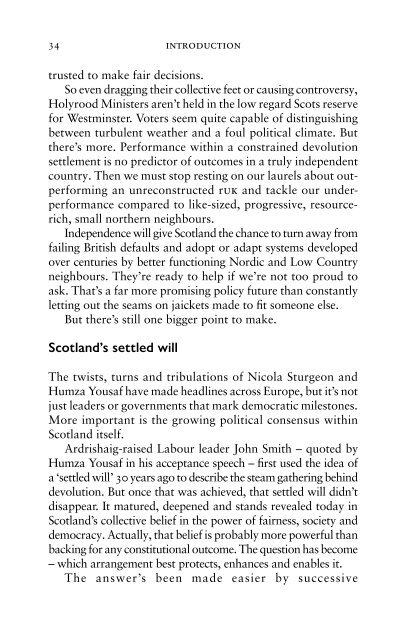Thrive by Lesley Riddoch sampler
Why won’t Scots simmer down? Why batter on about independence when folk voted No a decade back? After all. Scotland’s not as populated as Yorkshire, nor as wealthy as London. But it’s also not as Conservative, as keen on Brexit, or as willing to flog public assets to Tory party pals. So does Nicola Sturgeon’s departure terminally damage the case for independence? The answer, with all respect to her legacy, is no. Scotland has bigger fish to fry. In this book, Lesley Riddoch makes an impassioned call to action, weaving academic evidence with story, international comparison and anecdote to explain why Scotland is ready to step forward as the world’s newest state.
Why won’t Scots simmer down?
Why batter on about independence when folk voted No a decade back?
After all. Scotland’s not as populated as Yorkshire, nor as wealthy as London. But it’s also not as Conservative, as keen on Brexit, or as willing to flog public assets to Tory party pals.
So does Nicola Sturgeon’s departure terminally damage the case for independence?
The answer, with all respect to her legacy, is no.
Scotland has bigger fish to fry.
In this book, Lesley Riddoch makes an impassioned call to action, weaving academic evidence with story, international comparison and anecdote to explain why Scotland is ready to step forward as the world’s newest state.
You also want an ePaper? Increase the reach of your titles
YUMPU automatically turns print PDFs into web optimized ePapers that Google loves.
34 Introduction<br />
trusted to make fair decisions.<br />
So even dragging their collective feet or causing controversy,<br />
Holyrood Ministers aren’t held in the low regard Scots reserve<br />
for Westminster. Voters seem quite capable of distinguishing<br />
between turbulent weather and a foul political climate. But<br />
there’s more. Performance within a constrained devolution<br />
settlement is no predictor of outcomes in a truly independent<br />
country. Then we must stop resting on our laurels about outperforming<br />
an unreconstructed rUK and tackle our underperformance<br />
compared to like-sized, progressive, resourcerich,<br />
small northern neighbours.<br />
Independence will give Scotland the chance to turn away from<br />
failing British defaults and adopt or adapt systems developed<br />
over centuries <strong>by</strong> better functioning Nordic and Low Country<br />
neighbours. They’re ready to help if we’re not too proud to<br />
ask. That’s a far more promising policy future than constantly<br />
letting out the seams on jaickets made to fit someone else.<br />
But there’s still one bigger point to make.<br />
Scotland’s settled will<br />
The twists, turns and tribulations of Nicola Sturgeon and<br />
Humza Yousaf have made headlines across Europe, but it’s not<br />
just leaders or governments that mark democratic milestones.<br />
More important is the growing political consensus within<br />
Scotland itself.<br />
Ardrishaig-raised Labour leader John Smith – quoted <strong>by</strong><br />
Humza Yousaf in his acceptance speech – first used the idea of<br />
a ‘settled will’ 30 years ago to describe the steam gathering behind<br />
devolution. But once that was achieved, that settled will didn’t<br />
disappear. It matured, deepened and stands revealed today in<br />
Scotland’s collective belief in the power of fairness, society and<br />
democracy. Actually, that belief is probably more powerful than<br />
backing for any constitutional outcome. The question has become<br />
– which arrangement best protects, enhances and enables it.<br />
The answer’s been made easier <strong>by</strong> successive


















